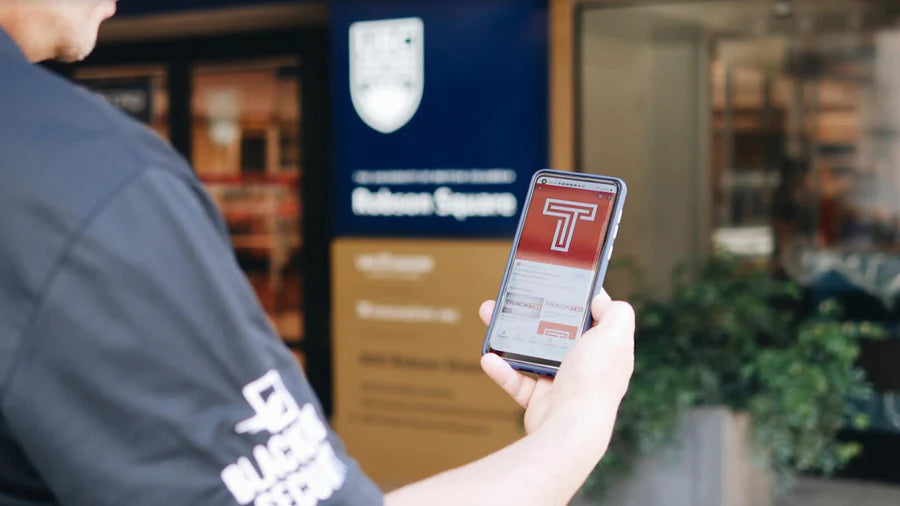Construction Site Security: The Ultimate Guide
Construction sites are at risk of security and safety issues. Because of the valuable materials stored on site and their open layouts, they’re frequent targets for theft, trespassing, and vandalism. Projects often run on tight budgets and schedules, meaning issues that fall through the cracks can cause major and expensive setbacks.
This guide explains how to protect your construction site and how having security can help you avoid setbacks. If you’re a decision maker at a construction site, whether for a residential build, commercial development, or infrastructure site, you’ll learn how to improve your security strategy to protect your assets, workers, schedule, and investment.
Table of contents:
- Security Threats Construction Sites Face
- Construction Site Security Guard Roles and Duties
- How Guards Keep Sites Safe
- Keeping Your Site Security Overnight, On Weekends, and During Holidays
- Safety and Emergency Response
- Choosing Security Services for Your Site
- Choosing a Construction Security Company
- Why Partner with Blackbird for Construction Site Security
- Construction Site Security FAQs

1. What Security Threats Do Construction Sites Face?
Construction sites often face issues related to theft, vandalism, and trespassing. Since 2020, the prices of raw materials such as copper and lumber have increased by 300%, incentivizing site thefts across Canada, including employee theft. The National Equipment Register estimates that losses due to theft at construction sites in Canada average around $400 million annually. A separate survey of 100 Canadian construction companies concluded that each company experienced an average of 1-2 thefts per year.
Aside from theft, vandalism and trespassing also pose issues that can lead to significant delays. Find out more about threats to construction sites in our blog, 5 Reasons Security Guards Are Essential for Construction Sites.
Investing in security helps protect your assets and ensure safety on your site. Next, we’ll look at how security guards make this happen.
2. What are the Roles and Duties of Construction Site Security Guards?
Security guards provide proactive, responsive protection for your site, helping prevent theft and other crimes. Here are the main security guard services you’ll find on construction sites:
On-Site Security Guards
Standard security guard services provide the most comprehensive level of protection for construction sites. These are the guards that likely come to mind when you hear “security guards”. They wear a distinctive uniform identifying them as security personnel, conduct regular foot patrols around the site, and respond to security issues as they arise. Their primary role is to ensure the site's general security at all times.
Mobile Patrol Security
Mobile patrol security is ideal for providing additional protection during off-hours when a full-time on-site security presence isn’t needed. These guards move between sites in marked security vehicles on a randomized schedule to deter bad actors. Once at your site, they conduct a foot patrol much like on-site guards, responding to any issues as needed. Mobile guards also respond to triggered alarms while away from your site, providing an additional layer of protection.
Read our breakdown of mobile patrol security in our blog, Mobile Patrol Security for Construction Sites Explained.
Front Desk Security Guards
Front desk security guards log the names, companies, and visit times of site visitors and subcontractors, verify identification, and provide directions as needed. These guards also monitor a site’s live CCTV camera feeds, providing a real-time overview of every area between foot patrols.
Gatehouse Guards
Gatehouse security guards control vehicle access to the site and maintain visitor records, similar to front desk guards. They are especially important at large or industrial sites where trucks and vehicles deliver materials directly on site property.
Live CCTV Monitoring
Live monitoring involves a security professional continually monitoring the live CCTV camera feeds at your site. This is ideal for companies with multiple sites, combining the benefits of security cameras with the added advantage of having someone available to warn trespassers via a remote communication system, send a security guard, or dial 911.
Curious to find out how CCTV solutions compare to on-site security? To help you navigate your options, we put them head-to-head in our previous blog, Construction Site Security Cameras vs. On-Site Guards.

3. How Do Guards Keep Construction Sites Safe?
Construction site security teams employ a variety of techniques to prevent crime in and around your site. Below is an overview of two of the most important security procedures guards use: foot patrols and access control.
1. Foot Patrols
Foot patrols are essential at construction sites. They ensure a complete, on-the-ground overview of site activities and monitor for security issues and signs of damage that might not be visible on CCTV cameras. Guards check for the following while on patrol in and around the perimeter of site properties:
-
Fence integrity and weak points
-
Secured gates and other access points
-
Secured lock boxes
-
Signs of tampering or trespassing
-
Equipment and materials in their designated areas
-
Maintenance issues
-
Weather damage
-
Safety concerns
Foot patrols can take place during the day when workers are on site, and at night or on weekends through mobile patrols. This extra security is especially important from Friday evening to Monday morning, when sites are most at risk of break-ins.
2. Access Control Management
Many construction sites, particularly those in major cities such as Vancouver and Toronto, are located in densely populated areas. Some sites, such as those on busy streets or near transit hubs, need to protect against foot traffic during the day and at night. Trespassing can pose serious security and liability risks during all phases of construction.
To combat this risk, security guards monitor and control all entry points around the site. They patrol the perimeters, stand guard at high-traffic areas, and oversee anyone who accesses the site. Your site may require a front desk security guard depending on its size and scale. If so, it’s best practice to implement a policy requiring site visitors to check in at the front desk.
Some construction sites, particularly those with parkades or sheltered areas, may be prone to vagrancy and trespassing. In these cases, a trained security guard can peacefully and professionally escort the individual off the property.
We covered site access control procedures in more detail in our article, How Do Construction Site Security Guards Manage Access Control?.

4. How to Keep Your Site Secure Overnight, on Weekends, and During Holidays
Mobile patrols are an effective solution for off-hour security. Construction sites require different security approaches for weekday working hours, overnight and weekend off-hours, and holidays. While many sites require on-site security personnel during the day, mobile patrols are an effective solution for sites during weekends and overnight.
Weekdays: On-Site Security
On-site security guards are essential for maintaining site security and safety during working hours. Construction sites in busy, high-traffic areas or areas with elevated crime rates are more likely to require increased security than sites in quieter areas.
Weekends: Mobile Security
Since most construction site thefts occur on weekends, you should consider scheduling security for those days. Because mobile patrol security guards aren’t present at your site for the duration of their shift, mobile patrols are a cost-effective security solution for construction sites that don’t require a 24/7 on-site security presence.
Similar to standard security patrols, mobile patrol security guards conduct site checks to ensure continued security, including the perimeter, any locked boxes or secured areas, material storage spaces, and tools and machinery. If any evidence of damage, theft, vandalism, or attempted break-ins is discovered, your mobile security guard will alert site management and, if deemed necessary, law enforcement, and will also write a detailed incident report.
Holidays: Mobile Security
Construction site theft rises when workers are absent, and this issue is compounded during holiday closures. With sites shut down for up to two weeks at the end of the year, they’re at a serious risk of theft and vandalism. The combination of absent workers, reduced neighbourhood activity, and extended nighttime hours during winter creates optimal conditions for criminals and bad actors to commit crimes.
Holiday security looks different for every construction site. The best solution depends on your site’s size, location, and budget. The most common holiday security solutions we provide to our construction clients are on-site and mobile patrol security.
Find out more about construction site security over the holidays in our blog, How to Keep Your Construction Site Secure Over The Holidays.
5. How Do Construction Site Security Guards Assist With Safety and Emergency Response?
Guards provide an extra set of eyes to monitor workplace hazards, assist in emergencies, and help reduce liability for developers by ensuring sites remain compliant with regulations. All of this, on top of the security-related duties we’ve already discussed. Tightened timelines, inclement weather, and increased workloads can all contribute to lapses in safety on job sites, which is why having a guard present on your site can be such a significant benefit.
Here’s how guards directly assist site managers and workers in safety efforts:
1. Monitoring for Overlooked Hazards
Guards focus on safety while crews work. They spot blocked exits, spills, tripping hazards, bad lighting, unsecured equipment, and clutter in busy areas. Early fixes prevent injuries and delays.
2. Ensuring Regulatory Compliance
Guards add checkpoints to enforce safety rules. They verify access, flag unsafe practices, create reports, and notify supervisors. This reduces liability and creates a clear record for inspectors and insurers.
3. Assisting in Emergencies
Guards are trained in first aid and CPR. They sound fire alarms, guide evacuations, keep fire lanes clear, and coordinate with police, fire, and paramedics. Some security guards are also trained in first aid, enabling them to provide help before first responders arrive.
4. Reporting
Security guards create comprehensive written reports, adding another checkpoint to ensure safety procedures are followed. This oversight helps developers and contractors reduce liability.
Curious to find out more about how guards directly benefit safety? Read our blog, How Security Guards Enhance Construction Site Safety.
Now that you’re familiar with the roles construction site security guards play, we’ll discuss how to determine the type and level of security your site requires.

6. Choosing Security Services for Your Site
The security services your site needs depend on several factors, including size, crime risk, value of access, and more. As a decision maker at your site, you want to provide as much coverage as is needed, but you also don’t want to overload your security budget unnecessarily.
To help you make an informed estimation of how much security your site requires, we’ve put together the following self-assessment checklist:
-
Site size and layout - Is your site a single-building site or a multi-structure complex with a wide perimeter?
-
Location and crime risk - Is your site located in a high-crime neighbourhood? Is it close to transit hubs or located in a remote area?
-
Value of assets - What is the value of your tools, machinery, and materials stored on-site? Are they stored in a secure indoor area or outdoors?
-
Access points - How many gates, doors, or entryways require monitoring?
-
Traffic volume - Does your site see a high number of workers, subcontractors, or deliveries daily?
-
Known security vulnerabilities - Does your site have a history of theft, vandalism, or trespassing?
-
Insurance and compliance requirements - Do your insurance or local regulations require security staffing levels?
-
Project phase - Is your site pre-construction, active build, or post-construction? Your needs will change by phase.
-
Supplementary technology - Will CCTV, alarms, or mobile patrols support your guards?
Need more comprehensive information? Find out our recommendations for site security based on site size in our previous blog, How Many Security Guards Do I Need At My Construction Site?.

7. Choosing a Construction Security Company
When comparing construction site security companies, consider the following factors to determine if the company is the right fit:
-
Industry experience: Choose a company that specializes in construction site security. Avoid firms with limited construction experience, as the cost of an incident will likely exceed any short-term savings.
-
Training: Well-trained guards are essential. Look for guards with advanced training in safety, incident reporting, and emergency response. Extra instruction in first aid and conflict de-escalation is an added benefit.
-
Services offered: Your site has unique needs. Work with a provider that offers flexible services such as on-site guards, mobile patrols, and CCTV monitoring. This flexibility allows coverage to grow as your project evolves.
-
Dedicated point of contact: A consistent point of contact, such as a site manager, improves communication and helps maintain smooth operations. They’ll stay familiar with your project’s needs and ongoing challenges.
-
Response times and availability: Your provider should operate 24/7 with clear procedures for handling alarms and emergencies. Incident response times of 5–15 minutes are ideal.
-
Area of coverage: Developers often build across multiple cities. Choose a provider with broad coverage that can scale with your projects.
-
Reputation: Review testimonials and ask for references from other builders or developers. Consistent positive feedback and long-term partnerships indicate reliability and trustworthiness.
Find out more about choosing a construction site security company in our article, How to Choose the Right Construction Site Security Company.
8. Why Partner with Blackbird for Construction Site Security
At Blackbird Security, we have advanced experience safeguarding construction sites all across Canada. We’re trusted to deliver premium construction site security services on major development sites with a team that understands the unique needs of builders, contractors, and developers.
Each Blackbird Security guard undergoes additional training through our in-house training program, Blackbird Academy. This training goes beyond the standard security training needed to obtain a security license and equips our guards with the knowledge needed to provide exceptional security services. Under our training team, guards are led through courses covering key topics such as Standard First Aid, Reporting Excellence, Peaceful De-escalation, and Fire Safety Training.
Our guards are also supported by TrackTik, the industry-standard security reporting software. TrackTik enables our clients and leadership teams to maintain real-time oversight of all activity at a given site, including live report updates and GPS locations of guards. TrackTik centralizes our guards’ reports in a single, easily accessible digital location, allowing our teams to stay informed about trends and make proactive decisions for the future.
At Blackbird Security, you’ll have a dedicated team member as your point of contact, providing stability and consistency throughout your day-to-day operations. We’re proud to provide top-tier construction site security services all across Canada, and we have the resources and expertise to grow with your projects.

9. Construction Security FAQs
What is construction site security?
Construction security is the practice of implementing measures to safeguard your construction site from theft, vandalism, and trespassing. These measures can include on-site security guards, off-site remote CCTV monitoring, and passive security measures such as fencing, locks, and lighting.
Why is security important on construction sites?
Construction sites are busy, high-risk environments. Heavy machinery, expensive materials, and rotating contractor crews all add to the challenge. Without security in place, any incident has the potential to cause significant setbacks.
In addition to your assets, security guards protect your timelines, budget, and reputation. Preventing accidents, theft, and compliance issues will help your team finish projects on time and on budget.
What security do construction sites need?
As no two sites are the same, there’s no way to prescribe security services without knowing a little about your specific site. Typically, a mix of security measures is the most effective approach. This can include on-site security, mobile security patrols, and gatehouse security coupled with a robust CCTV camera system, fences, and lighting.
Get in touch with a professional security company to find out exactly which services your construction site requires.
Does my site need 24/7 security?
The answer depends on your site's specific needs. While on-site security guards are essential during working hours, mobile patrols provide effective protection during nights and weekends. Sites located in high-traffic or high-crime areas benefit from tighter coverage and may opt for a more comprehensive security strategy, including frequent overnight patrols or static on-site security.
24/7 security coverage is ideal for:
-
Sites storing a significant amount of high-value equipment, vehicles, or materials.
-
Sites that aren’t able to provide secure indoor storage for the above items.
-
Sites located in high-crime areas or that have a history of theft or vandalism.
-
Large or complex sites with multiple access points.
-
Sites that see frequent deliveries or subcontractor visits.
Part-time coverage works well for:
-
Smaller sites with fewer high-value assets.
-
Sites where assets can be contained in lockboxes and secure indoor areas.
-
Sites in lower-risk neighbourhoods with fewer reported incidents.
-
Smaller sites in busy areas that require coverage during peak hours, or sites near schools that require after-school coverage.
Does my site need on-site security?
On-site coverage at your construction site will ensure incidents, such as trespassing, vandalism, and emergencies, are addressed promptly. When guards are on site, they can also provide oversight of issues such as broken CCTV cameras, gaps in fencing, evidence of damage or vandalism, and safety concerns throughout the site. We recommend that all construction sites located in busy, urban areas protect themselves with an on-site security presence during working hours.
How much does construction security cost?
You can most likely expect to pay between $25 and $70 per hour per guard for your construction site security. The cost of construction security services depends on factors such as your site’s size, its layout, where it’s located, how much crime happens in its neighbourhood, the value of the assets and equipment stored on site, the number of access points, the amount of foot traffic it receives, and security vulnerabilities measured during your initial security assessment. To get an accurate quote for construction security, please contact us.
How does the phase of my project affect my security needs?
Your security strategy may not be as effective from month to month as your project grows. Here’s a breakdown:
-
Pre-construction: After your site is cleared post-demolition, you likely won’t have too many high-value pieces of equipment on site. However, your site remains vulnerable to trespassing and vandalism.
-
Active construction: Once building begins, your site will see an increase in traffic and store valuable materials and equipment, requiring more security coverage to prevent theft.
-
Post-construction: Once your project is completed, you’ll need to protect your remaining on-site assets and prevent trespassing until turnover.
What patrolling techniques are used on construction sites?
Security patrolling techniques can vary depending on your site and specific security goals. Common techniques include:
-
Random patrols vary their timing and routes to maximize unpredictability.
-
Clockwise/counter-clockwise patrols follow a consistent perimeter route in either direction.
-
Zone patrols divide a site into distinct zones and focus patrol efforts within each.
-
Directed patrols focus on high-risk areas or those experiencing recent security issues.
-
Reporting and checkpoints provide a continuous record of specific site areas, offering insight into environmental changes.
What are the best ways to secure my site's perimeter?
A strong fence with locked access points, bright lighting, a solid access control policy, and standardized procedures for locking up at the end of each day are the best ways to ensure your site's perimeter remains secure. A security guard presence will further reduce and address unauthorized access incidents.
What are the best ways to prevent theft and vandalism on my construction site?
In addition to having an on-site security presence, the best ways to prevent theft and vandalism on construction sites are through access control, visitor logs, adequate lighting, and maintaining equipment and material logs. Training your site’s workers in security best practices, such as locking tools securely and implementing procedures for reporting suspicious behaviour, can further reduce theft and vandalism. Finally, building relationships with neighbouring businesses will help increase awareness around your site.
How do I get security signage for my construction site?
Your chosen construction site security provider should provide signage for your site. At Blackbird Security, for example, we provide and install security signage for our clients at no additional cost. We’ve seen the difference prominent, visible signage makes on construction sites, and we want our clients to have every advantage available to them.
Have a question that wasn’t answered here? Check out our blog, Construction Site Security: Our Most Frequently Asked Questions (FAQs).

Partner With Canada’s Number One Construction Site Security Provider
Protecting your assets and your stakeholders’ investments should be a top priority at your construction site. Our security team has years of experience guarding sites in cities like Vancouver, Toronto, Calgary, and Edmonton. Contact us today to find out how we can help protect your site now and in the future.








